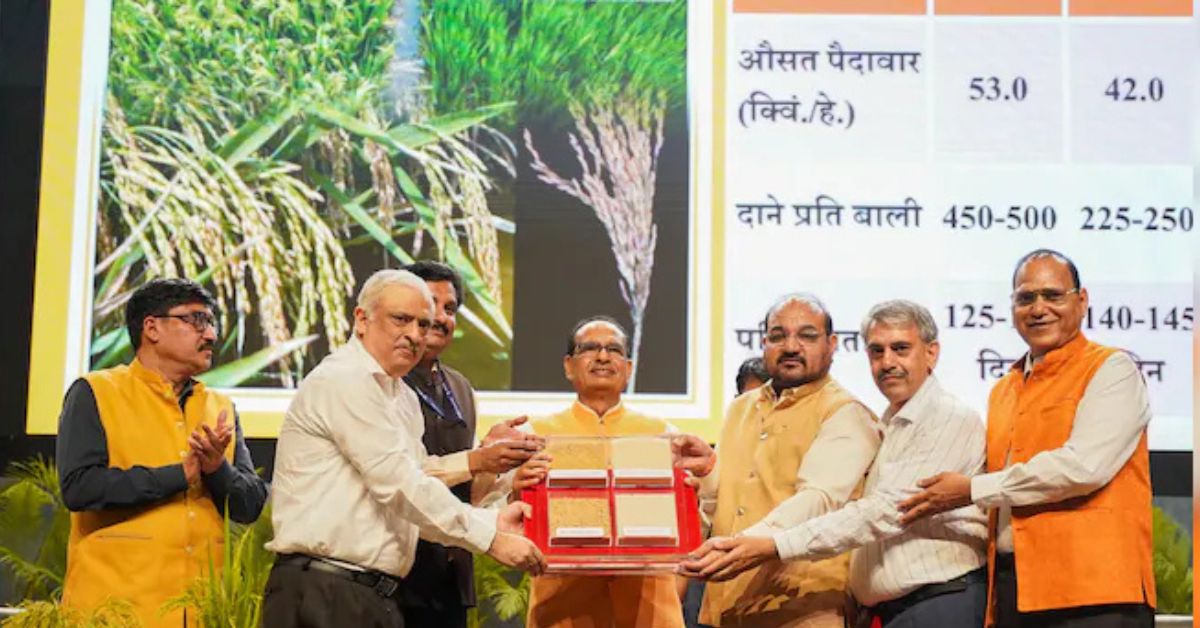How India’s First Genome-Edited Rice Could Help Farmers Grow More with Less Water and Less Waste
(Featured image courtesy NDTV)
In a groundbreaking development, India has introduced the world’s first genome-edited rice varieties — DRR Dhan 100 (Kamala) and Pusa DST Rice 1. These innovations promise to revolutionise rice cultivation by enhancing yields, conserving water, and reducing greenhouse gas emissions.
Developed by scientists from the Indian Agricultural Research Institute (IARI), New Delhi and the Indian Rice Research Institute, Hyderabad, these varieties are considered climate-smart and climate resilient.
Union Agriculture Minister Shri Shivraj Singh Chouhan officially launched these varieties on May 4, 2025, at the NASC Complex in New Delhi. Developed through genome editing, these rice strains are tailored to address the pressing challenges of climate change and food security.
The science behind the innovation
Genome editing, specifically the Site-Directed Nuclease 1 (SDN1) technique, was employed to enhance the genetic makeup of two widely cultivated rice varieties — Samba Mahsuri (BPT5204) and MTU1010 (Cottondora Sannalu).
This method involves precise alterations in the plant’s DNA without introducing foreign genetic material, distinguishing it from traditional genetically modified organisms (GMOs). By targeting specific genes that negatively impact crop productivity, scientists achieved significant improvements in yield and stress tolerance.
 The developed crops have been genome-edited and not genetically modified. Picture source: NDTV.
The developed crops have been genome-edited and not genetically modified. Picture source: NDTV.
Dr Vishwanathan C, Dr Gopal Krishnan S, Dr Santosh Kumar, Dr Shivani Nagar, Dr Archana Vats, Dr Soham Ray, Dr Ashok Kumar Singh, and Dr Pranjal Yadav were honoured for their work on Pusa DST Rice 1. Dr Satyendra Kumar Mangruthia, Dr R.M. Sundaram, Dr R. Abdul Fiyaz, Dr C.N. Neerja, and Dr S.V. Sai Prasad were given due credit for their contribution to the development of DRR Rice 100 (Kamla).
What are the benefits?
The newly developed rice varieties offer a multitude of advantages:
- Increased yield: Up to a 30% boost in per-hectare yields, enhancing food production efficiency. Cultivation of these varieties in about 5 million hectares will produce 4.5 million tons of additional paddy.
- Water conservation: A reduction in irrigation water usage by approximately 7,500 million cubic meters, addressing water scarcity concerns.
- Climate resilience: Improved tolerance to drought and salinity, ensuring crop stability amidst changing climatic conditions.
- Environmental impact: A 20% decrease in greenhouse gas emissions, contributing to sustainable farming practices.
These benefits not only support farmers’ livelihoods but also align with global efforts to combat climate change.
The introduction of genome-edited rice varieties signifies a pivotal moment in India’s agricultural landscape. By embracing cutting-edge biotechnology, the nation is poised to lead a second Green Revolution, focusing on sustainability. As these varieties become more widely adopted, they hold the promise of transforming rice cultivation, ensuring food security, and promoting environmental stewardship.
For more detailed information, you can refer to the official press release by the Indian Council of Agricultural Research.
Edited by Vidya Gowri Venkatesh
Source
News